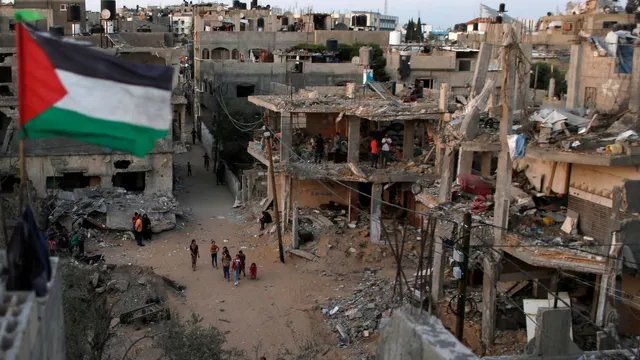- By Supratik Das
- Fri, 25 Jul 2025 09:26 AM (IST)
- Source:JND
In a historic statement that has created shockwaves across international diplomacy, French President Emmanuel Macron stated on Thursday that France will formally recognize Palestine as a sovereign state. This makes France the biggest Western power so far to do so, significantly increasing diplomatic pressure on Israel amid the catastrophic conflict and hunger crisis in Gaza. Posting on social platform X, Macron wrote, "The immediate thing today is that the war in Gaza ends and the civilian population is rescued. Because of its historical commitment to a just and lasting peace in the Middle East, I have decided that France will recognize the state of Palestine." He assured that the official declaration will be issued at the United Nations General Assembly in September.
The Palestinian Authority (PA) warmly welcomed the decision. Hussein Al Sheikh, vice president of the PLO, thanked Macron for his “commitment to international law and support for the Palestinian people’s right to self-determination.” A letter of recognition was presented Thursday to Palestinian President Mahmoud Abbas in Jerusalem. For the PA, weakened by internal divisions, corruption allegations, and limited control, international recognition remains one of its few remaining levers of political legitimacy.
The move is mostly symbolic at the moment but could dramatically change the global map. More than 140 nations already recognize the State of Palestine, including some EU member states like Spain, Ireland, and Norway, which made a declaration of recognition this year. France's gesture might open the door for other Western powers to do so. Ever since the Palestine Liberation Organization announced statehood in 1988, the Palestinians have pursued international approval of their control over the occupied West Bank, Gaza Strip, and East Jerusalem, lands Israel took in the 1967 Mideast war. To date, March 2025, 147 of the 193 countries in the United Nations have granted recognition. Yet with Israel's military occupation and growing settlements, currently home to more than half a million West Bank settlers, the independence of a Palestinian state is hotly debated.
Israel, US Slam Macron's 'Reward For Terror'
Israel quickly denounced Macron's statement. Prime Minister Benjamin Netanyahu stated, "Such a step would reward terror and threaten to create another Iranian satellite, as Gaza did. A Palestinian state under these circumstances would be a platform from which to destroy Israel — not to live in peace alongside it." Deputy Prime Minister and Justice Minister Yariv Levin characterised the action as "a black mark on French history and direct aid to terrorism," declaring it is "time to exercise Israeli sovereignty" over the occupied West Bank. The United States followed Israel's lead. Secretary of State Marco Rubio stated that the Biden administration "strongly rejects" the French action, calling it reckless and to the detriment of peace efforts. "This action does nothing but serve Hamas propaganda and roll back peace. It is a slap in the face to the victims of October 7th," Rubio tweeted on X.
What does recognition mean on the ground?
And yet, headlines notwithstanding, recognition does not automatically bestow on Palestine control over its territory, skies, or borders. Years of unsuccessful talks, unilateral settlements, military roadblocks, and the siege of Gaza have fragmented the Palestinian lands and placed them under de facto Israeli control. Refugees, some of whom live in camps throughout the region continue to face an uncertain future. The right of return, a central Palestinian demand is unresolved.
ALSO READ: US Pulls Out Of UNESCO Over 'Woke' Culture, Anti-Israel Bias; Israel Hails Decision
Recognition does, however, grant Palestine greater status in international legal institutions. It may allow for more effective legal challenges to Israel's occupation and new avenues in the International Criminal Court and elsewhere in the world. Middle East analyst Philip Leech-Ngo noted the biggest advantage is symbolic. "Recognition says that the international community acknowledges that the Palestinian cause is legitimate. In the context of extended occupation, that constitutes significant political capital," he explained to DW. France's bold move comes in the wake of growing outrage across Europe over worsening humanitarian crisis in Gaza. France and over two dozen European nations earlier this week condemned Israel's ban on aid deliveries and killings of hungry Palestinians attempting to cross to food. Britain and Germany have not yet taken a lead from France but are being increasingly pressured. UK Prime Minister Keir Starmer, during the announcement of emergency talks with Macron and German Chancellor Annalena Baerbock, reaffirmed his endorsement of a two-state solution, "A ceasefire will put us on a path to recognition and peace that guarantees security for both Palestinians and Israelis."
Yet divisions remain deep. The United States and the United Kingdom, both permanent members of the UN Security Council, continue to block Palestine’s bid for full UN membership, insisting recognition must come through direct negotiations with Israel. In the meantime, last year's advisory opinion from the International Court of Justice stated that Israel's occupation of East Jerusalem and other lands is illegal, alleging contravention of international law. But sanction still eludes them.
Hope Or Illusion?
For Palestinians, recognition is not enough to end the occupation, the siege of Gaza, halt settlement growth, or provide refugees with the right of return. As war rages, hunger spreads, and diplomacy stalls, Macron's bet shines new light on a conflict that has dragged on for over 75 years. Whether this bold step inaugurates substantial change or simply reenacts past vows remains to be determined.

